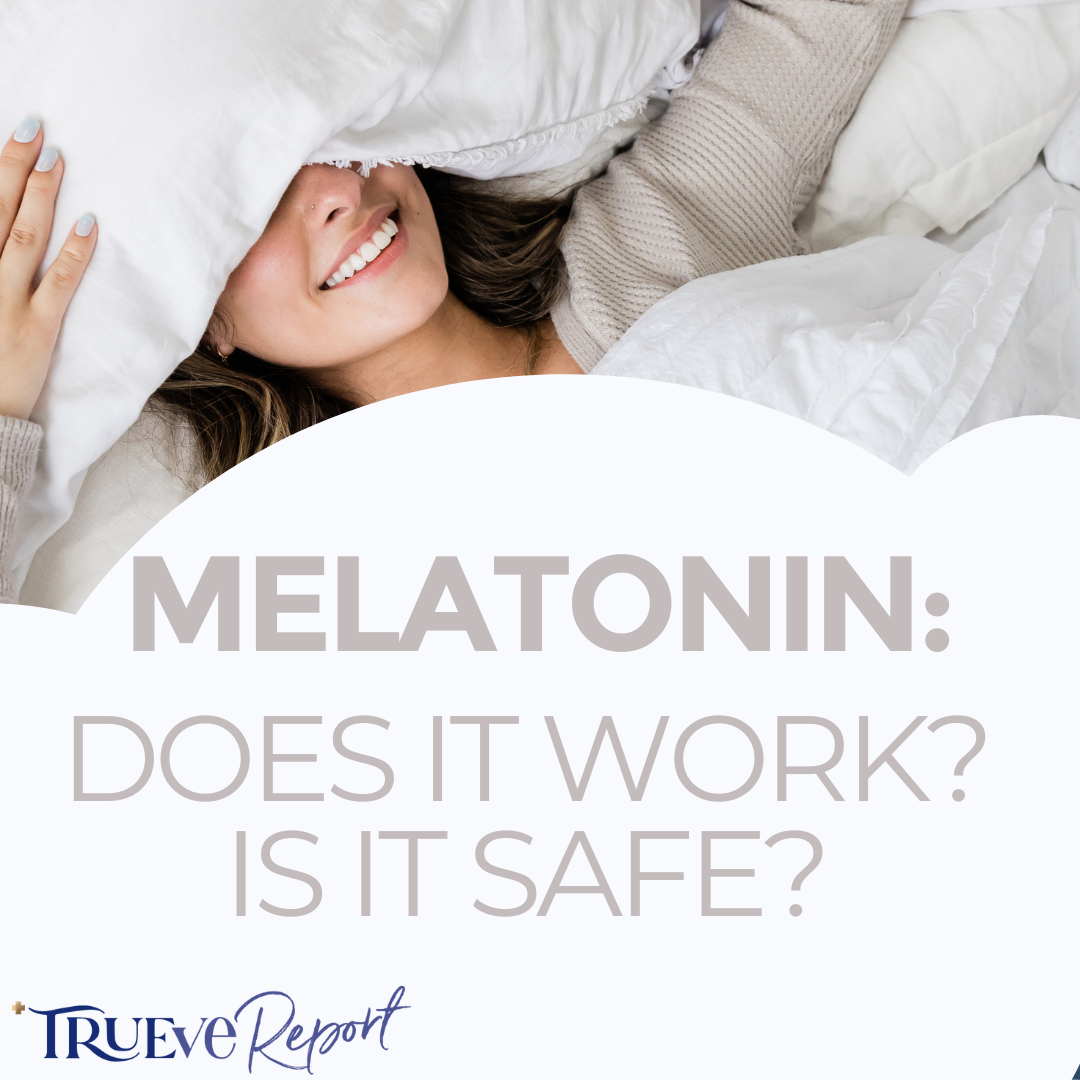When I was in residency, sleep deprivation was the norm. One morning after being awake for a 36-hour shift, I started crying. Not just crying, BAWLING. My professor said “Darria, why are you crying?”, to which i responded, “I Doonnn’t knowwwwww”. I’ll never forget what she said: “You’re crying because you’re exhausted. Sleep deprivation is a torture tactic. Spies use it to break people. That’s why”. Suddenly, I knew – (1) I’d never be a spy because I would have given away nuclear secrets for a nap, and (2) I wasn’t CRAZY. I was just SO tired.
Been there? If you’re feeling burnout, getting those extra zzz’s can also feel even harder. After I wrote “Is Melatonin Safe For Your Child?,” You asked if it was ok for adults. Clearly, we’re a sleep-deprived tribe. (I sit here finishing this with my blue-blocking glasses on, as it’s 9pm).
I hear you – so we did some digging. And TBH? I was surprised by what I found – and how much misinformation swirls around melatonin. Read the highlights below – and the full report for more
tl;DR Melatonin for sleep - key to know
- Melatonin impacts reproductive hormones. The ovaries and other reproductive organs have melatonin receptors, as it regulates our reproductive cycles. Melatonin was even proposed as an oral contraceptive component in the 1990s. Taking it has been associated with decreased / absent periods and decreased sperm count. On the flipside, IVF doctors sometimes use it, as the ovaries concentrate melatonin at levels far above what’s in the blood. So, the effect can be mixed, but it’s clear that it can impact reproduction, and if you’re considering pregnancy, be cautious.
- Melatonin bottles may actually have 10% – 500% of the dose written on the label (and may include serotonin). Melatonin is sold over the counter (OTC) in the US – but many countries require a prescription. They might have the right idea. One study showed that bottles had up to almost 5 times as much melatonin on the label. If you take it, buy a brand with 3rd-party verification.
- Most melatonin advice recommends taking it at entirely the WRONG time. Most guidance recommends taking melatonin 30 minutes prior to sleep – which won’t reset your circadian rhythm, and only makes you sleepier the next day. Take between 2 ½ – 5 hours before bed, depending on the dose (see report for a recommended protocol).
- We don’t know the L-T consequences of taking it. We just don’t. There’s not good data.
On a good note, side effects of melatonin are generally mild. Plus, unlike many other sleep aides, melatonin does not lead to tolerance, dependence, or withdrawal. Side effects include headache, dizziness, diarrhea, “psychedelic dreams”, and daytime sleepiness – but stop when you stop taking it, and are minimized by taking lower doses.
On an “around the corner” note – melatonin as an anti-oxidant: We’re finding out more and more what melatonin does in terms of anti-oxidant activity – will write more on this in the future!
Is taking melatonin for sleep effective?
There are areas in adults, where melatonin seems to help:
- Delayed sleep cycle (ie: you need/want to sleep by 10p, but are wide awake until midnight)
- Jet lag
- Insomnia in elderly without dementia
Overall, the misinformation on melatonin was eye-opening. Read the full report to set the record straight – and see the sleep reset protocol I recommend. Happy snoozing 🙂
FULL REPORT: Should you take melatonin for sleep?
What IS Melatonin?
First of all, what IS melatonin? It’s actually a hormone, meaning that it’s released in specific places in your body (the brain’s pineal gland, the retina, and the gut). It then is released into the blood and triggers processes throughout your entire body – from your brain to your liver to your ovaries (or testicles, if ya got ‘em).
What’s the difference between the melatonin our body makes and what we take in a pill?
In medicine, we use the terms “Endogenous” versus “Exogenous”. Endogenous means our body is making the substance (like when our body naturally releases melatonin). Exogenous is when we are TAKING the substance (like taking melatonin as a supplement). The difference? When it’s endogenous, our body controls how much and when it’s released – and when that stops – with an exquisite set of checks and balances. When you take it as a medication, you get a lump dose, at the time you decide, that our body cannot control. You can imagine how this could trigger much different primary and downstream effects. Taking a melatonin supplement just can’t replicate the body’s natural melatonin cycle.
How Does Melatonin Work?
- Chronobiotic – This is melatonin’s primary effect, meaning it keeps our body on its Circadian Rhythm, or 24-hour (ish) cycle. It’s naturally produced 1-2 hours prior to bedtime, and peaks between 2-4am. In doing so, it keeps all of our body on this regular cycle, from sleep, to metabolism, to other body processes. As sleep expert Dr. Michael Breus put it, “Melatonin is not a sleep initiator – it’s a sleep regulator. It doesn’t help you fall asleep, it helps your brain know it’s bedtime.” Of note, melatonin does NOT help you stay asleep.
- Hypnotic – Melatonin also helps to decrease our brain’s alertness, facilitating sleep onset, although this effect is relatively mild. When taken as a supplement, particularly at higher doses (especially 10mg or higher), however, melatonin can have this effect, which can sort of make you feel “knocked out”, an effect similar to drinking alcohol or taking various other sleep medications.
How Does Melatonin Work?
Our body’s melatonin cycle evolved to be influenced our environment and habits (it’s dark out, so we sleep, it’s light or noisy or warm, we wake). That was useful for millennia – but today’s blue lights, late nights, and artificial environments mean it’s now VERY easy to throw off our melatonin cycles – and our sleep.
Our problem isn’t that we’re “too low” on melatonin. Our problem is that we have messed up our body’s melatonin cycles.
Is a melatonin supplement SAFE for sleep?
For overall safety, melatonin appears to have very few severe adverse effects, with side effects being mild. As far back as 2012, studies reported that 3 million American adults reported taking melatonin in the prior 30 days. However, we ARE talking about a hormone here, and we lack really strong long-term data, and a few areas in particular give me pause. I’ve highlighted these below.
- There’s no long-term data: Most studies for melatonin tend to focus on relatively short periods. One looked at 96 healthy adults for 12 months, and another for 29 weeks (which showed good safety but little efficacy), but the vast majority are 4-8 weeks or less. I’ve shared a table below of where data does (and doesn’t) exist.

- From a strictly “mortality” perspective, melatonin is pretty safe. Rat studies have shown they can be given massive amounts, without major life-threatening effects (although I’m sure they had some cracked-out dreams).
- Side effects tend to be mild, without tolerance, withdrawal, or dependence.
- Melatonin shows fewer adverse effects than other sleep medications, without signs of reported tolerance, withdrawal, or dependence (which is NOT the case with many other sleep aids).
- At low doses (3mg or less), side effects in general appear to be minimal. These are typically mild – in most that’s only a mild headache, daytime sleepiness, headache, dizziness, diarrhea (not sounding too pleasant), vivid dreams and nightmares, daytime sleepiness, irritability, and stomach cramps, changes in blood pressure, and worsening of alopecia, but it’s otherwise generally considered safe.
- Caution with higher doses: As doses rise (especially 10mg or higher), so do adverse effects.
- Melatonin impacts our reproductive system.
- Our reproductive system has melatonin receptors, and it’s clear that melatonin has a regulatory effect on our cycles. According to Dr. Austin Schirmer, a reproductive endocrinologist, “Most people think of it as a sleep hormone, but it also absolutely regulates and affects cycle length”.
- Small studies have shown that it inhibits LH (a reproductive hormone), estrogen, and progesterone. It also was shown in some studies to decrease sperm quality, and cause amenorrhea (lack of menstrual cycles) in women. Melatonin + Progestin was proposed as an oral contraceptive in the 1990s. Also, ovarian cells concentrate melatonin at levels far higher than what’s in our blood.
- On the flipside, melatonin is also sometimes used in fertility treatments (for its antioxidant benefits). I asked Dr. Austin Schirmer, to explain further – how can it both suppress our cycles yet also be used by IVF doctors? His response was that in IVF, they prescribe large amount of hormones, so that overcomes any hormone-suppressing effect of melatonin. However, for a woman trying to get pregnant naturally, who isn’t taking those hormones? He said, “it may have an impact on ovulation – because their natural hormones wouldn’t override the potentially hormone-suppressing effects of melatonin. It definitely HAS an impact on reproduction, we just don’t know to what extent it may impact fertility.”
- In pregnancy or breastfeeding:
- There is no data on the use of melatonin in pregnant or breastfeeding women. However, we do know that melatonin is a small molecule, and is transferred into breastmilk. That means it could potentially cause sedation in nursing infants.
- Melatonin has immunologic, anti-inflammatory effects.
- High doses (10 mg or higher) significantly decrease levels of our immune signaling system (TNF-alpha and IL-6 – you may remember hearing about these from COVID reports and coverage). What’s the impact on our immune system, when we’re taking it for sleep? Studies didn’t have answers on that – so this is an area to watch.
- Medication interactions:
- Melatonin interacts with some medications, including blood thinners, seizure medications, oral contraceptives, some anti-depressants, antibiotics, and Also, when combined with sedative or anti-anxiety medications, it can cause additive sedation effects.
- Taking at the wrong time can throw OFF your CR: If you take it at the wrong time, you can actually disrupt your sleep cycle further. (see below for the proper timing)
- Over the counter bottles are often vastly mis-labeled
- While Melatonin is required to be sold ONLY as a prescription in some countries, it’s available over the counter in the US. (Of note, there is a prescription melatonin analog available in the US – see below). Unfortunately, the melatonin you buy over the counter the counter is not regulated by the FDA, and the label can often be entirely incorrect.
- A recent study out of Canada showed that the actual content of the supplement may range from 10% – 480% of what the label says – and some even contained Serotonin.
- Even more concerning? The biggest variability occurred in smaller doses (often used in kids): bottles labeled as 1.5mg Melatonin contained as high as 9mg.
- Melatonin is implicated in child overdoses – (Schire)
- Poison control center calls for melatonin ingested by children increased by 70% in the last year. So, if you do take melatonin, please keep it far out of range of little paws.
- While Melatonin is required to be sold ONLY as a prescription in some countries, it’s available over the counter in the US. (Of note, there is a prescription melatonin analog available in the US – see below). Unfortunately, the melatonin you buy over the counter the counter is not regulated by the FDA, and the label can often be entirely incorrect.
Is Melatonin EFFECTIVE for Sleep?
**A note on the data: Good data on melatonin treatment in healthy, non-elderly adults is sparse. Much of it is extremely heterogenous, in terms of timing (when melatonin was taken), dosages, formulations, and even individual participants, making general conclusions difficult.
However, from our review, when it comes to otherwise healthy adults, the data so far shows that melatonin is most effective when taken for a short-term period and in conjunction with lifestyle and environmental changes.
As Dr. Param Dedhia, internist, integrative medicine doctor, and director of sleep medicine at Canyon Ranch in Tucson, Arizona for the past 12 years put it so well: “It’s not an island, it’s a bridge”.
(1) General insomnia
The evidence for melatonin for “general insomnia” is pretty disappointing; multiple studies have shown no benefit in taking melatonin for alertness, sleep quality or duration. In one study, taking melatonin helped 8/10 individuals, but made 2/10 worse, highlighting how melatonin can impact us so individually. In another, taking 0.3-1 mg of melatonin two hours before bedtime improved sleep time by 7-22 minutes, and sleep efficiency by 2-5%. It did appear, however, that the gain in sleep was all in non-REM sleep. A separate study highlighted that melatonin may be most helpful in people with chronic health issues.
(2) Delayed Sleep-Wake Disorder
Staring at the ceiling and unable to fall asleep until hours after you’d like – only to then struggle with getting up in the morning? It could be a sign of delayed sleep-wake disorder (DSWD). DSWD is defined as trouble falling asleep because your Circadian Rhythm is shifted later (by 2 hours or more). Late nights, bright lights, smart phones (with their blue light), and… just…life… have made this a problem for many of us. Our melatonin cycle is strongly influenced by our routines and environment – and can easily be thrown off. In that case, a short course of melatonin (as part of the sleep reset protocol), below, can be useful.
While they’re not huge studies, studies in healthy adults show that taking melatonin can help shift their circadian rhythm, and allow them to fall asleep, on average, around 30-50 minutes earlier.
(3) Jet Lag
Jet lag (especially after crossing 6 or more time zones) is another area where taking a short course of melatonin can be useful.
Here’s what’s typically suggested: (see more in the Sleep Reset Protocol” below).
● Flying east: Take melatonin 1-4 hours before new bedtime, for up to 5 days.
● Flying west: Most don’t need to take melatonin to fly west, and this also risks sedation during the day, but if you’re crossing many time zones, then it’s recommended to take it in the morning, shortly after waking up.
● Some studies suggest taking it 2 days prior to their trip (but you’d have to balance the risk of more sedation in those days before the trip).
● Study participants reported being less tired during the day and adjusting to normal sleep patterns about 1 ½ days more quickly than without it.
(4) In elderly people without dementia
As we age, our body makes less melatonin. Studies have shown that in people over 55 years of age without dementia, saw an 11% improvement in sleep quality and 11 minute increase in average sleep. In Europe, melatonin is actually approved as treatment for primary insomnia in people over 55.
(5) During Daylight Savings
A change of an hour can be enough to throw us off – (as anyone walking around like a zombie after the time shift in spring knows) – but not typically enough to necessarily need melatonin. Falling back (just like going westward) is usually pretty easy for most of us. Going forward can be harder – in that case, you can consider melatonin, although most can make the adjustment without it.
(5) As an anti-oxidant
There’s fascinating new research coming out on the anti-oxidant role of melatonin – often released by other cells within our body. I’ll dive into this more in the future, as it’s very promising! (And may present some fabulous bio-hacking opportunities to allow our body to naturally produce more melatonin)
**Melatonin is also incorporated into other therapies, including some cancer treatment and fertility therapies. However, we’ve focused on the sleep effects in otherwise healthy adults for this article.
The Sleep Reset Protocol
Struggling to fall asleep as early as you need to and want a remedy? Try this Sleep Reset Protocol, pulled together from the research in this paper and discussions with experts. As always, this is not a prescription – but a recommended starting point. ☺
Dr. Param recommends that most of his patients follow this process for about 10-14 days, to see maximum effect. After that, maintain the lifestyle changes that you made, but stop taking the melatonin.
- Consider checking the following labs with your doctor: TSH, Vitamin D, Magnesium, and Iron. Dr. Breus notes that he always has his patients check these levels if they’re struggling to sleep .
- Add in the following supplements:
- Vitamin D (most of us need more than the recommendations)
- 250mg Magnesium glycinate (easier to stomach than magnesium threonate, although the latter may be more effective, per Dr. Breus)
- Iron
- An Omega supplement
- Perform a sleep room audit:
- Keep temp 63-68
- Install light-blocking curtains or blockers around doors
- When it’s dark, turn out all the lights and see what little blinking lights you can see. Block them with anything from duct tape to a t-shirt, as these can disrupt your sleep even with your eyes closed.
- Get rid of that bedroom clutter; your bedroom should be a sanctuary. Try your best not to leave laundry, taxes, or other fun things out. Having those items within sight as you try to fall asleep becomes a living to-do list. Not relaxing in the least.
- If the last time you got a new pillow, sheets, or a mattress was the prior millennia (or if you have worn out divots in your mattress that stay there even when you get up), that could be affecting your sleep. Consider an upgrade.
- New habits:
- Create a “lights out” time and a “wake up” time EVERY night and EVERY morning for the next 2 weeks (you can vary by about an hour on weekends, but the more you vary, the more the cycle will be off. I know. That’s less fun).
- The hardest part: Plug in ALL blue light devices (phone, smart pad, etc.) for 90 minutes (yes, NINETY) before bed, preferably in another room. Need to be on a device for work? Score some blue-light blocking glasses or set your device on “night mode”.
- Melatonin: Take a melatonin supplement for these 10-14 days (see “What dose to take” and “when to take it.”)
What dose to take?
Most experts in the field recommend starting with the smallest effective dose. For some that may be as small as 0.5mg. Doses of 1-3mg (specifically 3mg in some studies) create a more reliable Circadian shift.
If you do choose to take melatonin, given the huge mis-labeling on OTC products, make sure to choose a brand that has independent 3rd party certification, such as the USP or NSF, so at least you can feel more comfortable that what is on the label, is what you’re taking.
When should you take it?
To go to bed earlier:
If you’re taking melatonin 30 minutes prior to your desired bedtime, you’re taking it too late to actually shift your Circadian Rhythm, and it may be making your sleep (and drowsiness the next day) worse. For melatonin supplements to be most effective, they have to be timed properly: taken BEFORE your body’s natural melatonin evening rise, and approximately 10-12 hours before your body’s lowest temperature, which occurs around 4-5am.
While studies have looked at everything from at bedtime to several hours earlier, the best effect appears to be between 2 – 4 hours before your desired bedtime. Again, start small, although studies seem to show a more reliable effect at 3mg, than 0.5mg.
Smaller doses (0.5 mg) of melatonin:
Take melatonin around 1 ½ – 3 ½ hours before desired bedtime. So, if your normal bedtime is 11pm, and you want to shift to 9pm, take melatonin between 5:30-7:30 pm (roughly 10 ½ hours before your lowest body temperature).
Larger doses (3-5mg) melatonin:
Larger doses (3-5mg) should be taken a little earlier, around 2 ½ – 4 ½ hours before desired bedtime. So, If your normal bedtime is 11pm and you want to go to bed at 9pm, take 3 mg of melatonin at roughly 5:30pm-6:30pm.
To go to bed later:
In the situation that you fall asleep too soon, you can take melatonin in the morning.
Smaller doses (0.5 mg) of melatonin:
If normal bedtime is 9pm and needs to be 11pm and you typically wake up at 6am, taking 0.5 mg of melatonin between 9:30am – 10:30am will help produce maximal delay of sleep time.
For a dose of 3 mg of melatonin:
If normal bedtime is 9pm and needs to be 11pm and you typically wake up at 6am, take 3mg of melatonin between 7am-9am.
What about melatonin from nutritional sources?
We have had MANY people ask us about taking melatonin from food, so we did a quick review. It turns out that you can find melatonin in a variety of food sources, with tart cherries being one of the most predominant. In one study sponsored by the maker of tart cherry juice, adults over 65 who drank 8 ounces of cherry juice 2 times daily, fell asleep 17 minutes earlier, although there was no significant improvement in total sleep time, efficiency, or fatigue. Another industry-sponsored report noted significant improvement in sleep time by 84 minutes, although they did not share their raw data, and other findings were largely not significant. We would also note, however, that 16 ounces of cherry juice also comes with about 50 grams of sugar, and 200 calories.
Another study also looked at milk at night – another potential source of melatonin – but overall effects were minimal.
What about prescription melatonin?
In recent years, a number of prescription medications have arisen, which are “melatonin agonists”, meaning they stimulate the effect of melatonin. Prescriptions for this in the US include Ramelteon. Ramelteon does come in only one dose – and a relatively high one at that – 8mg. In a review of Ramelteon versus other sleep medications, both Ramelteon and melatonin had less efficacy than the other sleep prescription medications, but also had significantly fewer adverse effects (both serious and mild), and did not show withdrawal or rebound, unlike many other prescription sleep aids.
All my best,
- Dr. Darria








